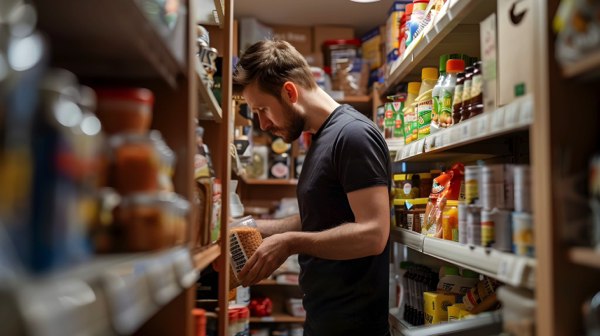
They normally focus on being adaptable, creative, resourceful and self-sufficient, while also emphasizing the value of community and working together. What was once seem as "an extreme activity" or "fringe" is now becoming more common and mainstream. They prepare for a range of potential events, including natural disasters, power outages, terrorism and wars.
Recent events, such as the pandemic and various natural disasters, have shown the importance of being prepared. Knowing that you have the essentials on hand can provide peace of mind and security – no matter what life throws your way.
With that in mind, here is a short list of what you may need to be prepared for any situation.
Water tools and supplies
Water is essential for survival so it is crucial to have reliable sources of water and ways to purify it.
Start with plastic water storage containers for storing tap water and consider a rainwater collection system to capture natural resources. Keep water filters and purification tools on hand to ensure safe, clean drinking water.
Also, stock up on bottles of bleach for disinfecting water (just a few drops per gallon can make it safe). Having a few portable water bottles with built-in filters can also be useful if you need to leave your home.
Food tools and supplies
When it comes to food, variety and longevity are key. Stock up on freeze-dried and canned meats as they provide essential protein and have a long shelf life. Include long-shelf-life foods, such as beans, dried fruits and vegetables, pasta and rice, that meet your family's nutritional needs.
Make sure to have cooking appliances like camp stoves or portable gas burners, along with durable cookware and cooking utensils. You also need airtight containers and vacuum sealers to keep your food fresh for as long as possible.
First aid kits and medical supplies
Accidents and injuries can happen so it is vital to have a well-stocked first aid kit. This should include essentials like a CPR mask, EpiPen, gauze, pressure bandages, surgical tape and a trauma kit for more serious injuries.
Don't forget over-the-counter medicines like antihistamines, antiseptics and pain relievers, as well as personal or prescription medications that you or your family members may need.
Heat and warmth supplies
Staying warm is critical, especially in colder climates or during power outages. Consider having a traditional wood stove or heaters that use alternative energy sources, like kerosene, propane or solar power.
For personal warmth, each family member should have a sleeping bag rated for low temperatures. Stock up on space blankets, heat packs and thermal blankets for additional warmth in emergencies.
Small energy devices
Power outages can be common during emergencies so keep camp stoves for cooking, solar chargers for small electronics and hand-cranked generators to power essential devices without relying on batteries. (Related: Power outage preparedness: Staying safe and comfortable during a blackout.)
Illumination devices
Light is not only a comfort but also a necessity. Keep a variety of illumination devices like candles, flashlights, glow sticks, headlamps and lanterns. Stock extra rechargeable batteries and consider solar-powered lights that charge during the day.
Fire starting tools
Being able to start a fire is crucial for cooking, signaling for help and warmth. Have multiple fire-starting tools on hand, including ferro rod strikers, lighters, storm-proof matches and tinder or commercial fire starters.
Personal hygiene and sanitation items
Maintaining hygiene is crucial to prevent illness. Stock up on antibacterial wipes, feminine hygiene products, hand sanitizers, soap, toilet paper and toothpaste. A portable toilet or bucket with liners can be helpful if plumbing is unavailable. Don't forget trash bags to safely dispose of waste.
Essential hand tools
Having a basic set of hand tools like cordage, duct tape, hammer, multi-tools, screwdrivers and zip ties can help with repairs and building makeshift shelters. A sturdy shovel and axe are also useful for digging and cutting wood.
Communication devices
Staying in touch with others can be critical during a crisis. Keep a battery-powered or hand-cranked radio for updates on weather and emergency broadcasts. Consider two-way radios or walkie-talkies for communication with family members, trusted friends and neighbors if cell networks are down.
Self-defense tools
Safety is a priority in uncertain times. Depending on your comfort level and local laws, consider self-defense tools, like pepper spray, a personal alarm and other non-lethal weapons, or more substantial options, like firearms with proper training.
Miscellaneous tools and supplies
Think about additional supplies that could make life easier and safer in a crisis, such as fishing, foraging and hunting gear, maps and compasses, tarps, and so on. Having a backup supply of cash in small bills or different denominations can be useful as well if digital payment systems are down.
Watch this video about the step-by-step guide to survive global chaos.
This video is from the High Hopes channel on Brighteon.com.
More related stories:
Prepping 101: 4 Essential tips for new preppers.
Creating a bug out plan: Essential steps for emergency evacuation.
Prepping tips: Stockpiling non-perishable foods and water.
Essential skills for urban prepping: How to prepare for emergencies in a city environment.
Sources include:
SHTFPlan.com
TruePrepper.com
Utopia.org
SkilledSurvival.com
MedKitAuthority.com
Brighteon.com
Source link

